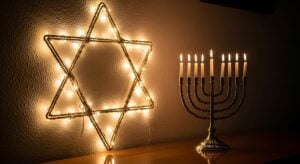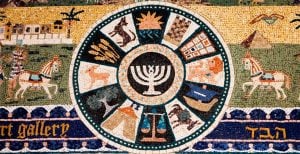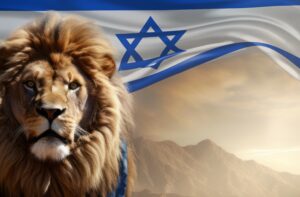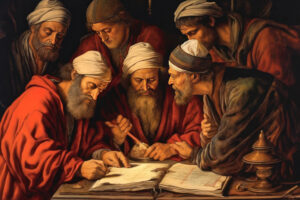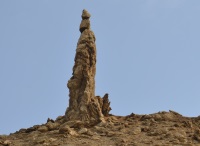 Name: Vayera
Name: Vayera
Reading: Genesis 18:1 – 22:24
Haftara: Kings 2 4:1 – 4:37
Parsha Summary – Vayera
Abraham and the Angels
Abraham sees three travelers in the desert. He runs to greet them and offers them water to wash their feet and bread to eat. The men accept. Abraham asks Sarah to bake cakes while he prepares milk, butter, and meat, which the strangers eat. They tell Abraham that they will return in a year, by which time Sarah will have a son. Sarah laughs, and God reassures Abraham that he will sire a mighty nation.
Sodom and Gomorrah
 God tells Abraham that He is going to destroy the sinful cities of Sodom and Gomorrah (where Abraham’s nephew Lot currently lives with his family). Abraham begs God not to if he can find 50 righteous men in the city. God agrees – but says that there aren’t. Abraham bargains all the way down to 10 righteous people – but there aren’t enough to convince God to save the city.
God tells Abraham that He is going to destroy the sinful cities of Sodom and Gomorrah (where Abraham’s nephew Lot currently lives with his family). Abraham begs God not to if he can find 50 righteous men in the city. God agrees – but says that there aren’t. Abraham bargains all the way down to 10 righteous people – but there aren’t enough to convince God to save the city.
Two of Abraham’s three angels go to Sodom where they find Lot who offers them food and shelter. The Sodomites want him to surrender his guests to them; he offers them his virgin daughters instead. They refuse and threaten to hurt Lot, and his angel visitors blind the angry Sodomites. They tell him to take his family and flee, and not to look back. Fire and brimstone rain down on the cities and Lot’s wife turns back and is turned into a pillar of salt.
Lot and his Daughters
Lot’s daughters witness the destruction of their home and think that the world has ended. On two consecutive nights, they get Lot drunk and sleep with their father. Both women conceive and have sons.
Abraham and Abimelech
 Sarah and Abraham travel to Gerar, where they tell people that they are brother and sister. The king Abimelech calls for Sarah; God appears to him and tells him that he will die for taking another man’s wife. Abimelech protests his innocence, and God tells him to return Sarah and ask Abraham to pray for him. The king rewards Abraham with sheep, cattle, money, and servants, and after Abraham prays for him, God forgives him.
Sarah and Abraham travel to Gerar, where they tell people that they are brother and sister. The king Abimelech calls for Sarah; God appears to him and tells him that he will die for taking another man’s wife. Abimelech protests his innocence, and God tells him to return Sarah and ask Abraham to pray for him. The king rewards Abraham with sheep, cattle, money, and servants, and after Abraham prays for him, God forgives him.
The Birth of Isaac and Dismissal of Hagar
Sarah conceives and gives birth to a son. Abraham names him Isaac and circumcises him at eight days old. Sarah becomes angry with Ishmael and tells Abraham to kick out Hagar and her son. He gives them water and bread and sends them away. Ishmael becomes sick; Hagar prays to God who reassures her that her child will live and father a great nation. Abraham and Abimelech renew their acquaintance and Abraham digs a well in Beer-Sheba for Abimelech’s people.
Akeidat Yitzhak – The Binding of Isaac
God appears to Abraham and tells him to offer his beloved son Isaac as a burnt offering. They travel away for three days, then Abraham builds an altar and binds Isaac to it. Abraham stretches out his knife to sacrifice his son; in the nick of time, God tells him not to and sends a sheep to be offered instead. God blesses Abraham with descendants as numerous as the stars in the sky and sand on the shore as a reward for his extreme devotion. Abraham, Isaac and their servants return to Beer-Sheba. Abraham’s nephews are listed.
Torah Takeaway
 There are two very important lessons we can learn from Abraham: hospitality, and the proverbial notion of “say a little and do a lot”.
There are two very important lessons we can learn from Abraham: hospitality, and the proverbial notion of “say a little and do a lot”.
This reading begins by telling us that God came to Abraham when he was sitting at the entrance to his tent. The sages teach that he was sitting there to recover from the events of the previous chapter when he circumcises himself and his son. Despite the considerable pain he must have been experiencing, he ran to greet the three travelers and welcome them into his home. He epitomizes the traits of hospitality and kindness.
When he proposes a rest to the three men, he simply offers them “water to wash their feet” and to “bring a little bread” (Genesis 18:4-5). When they accept his hospitality, he rushes to ask Sarah to bake cakes from fine meal, then slaughters and prepares a calf. Instead of the simple bread and water he offered the traveling strangers, he serves his guests meat, milk, butter, and cakes under the generous shade of a tree.
The cynic may say this teaches to offer only minimal help so that anything more seems excessive and generous, but there is a more charitable explanation: even where the bare minimum will suffice, we should make the effort to give the best that we can. It’s not about exceeding expectations; rather, we should always strive to give the very best of ourselves to the people around us.
